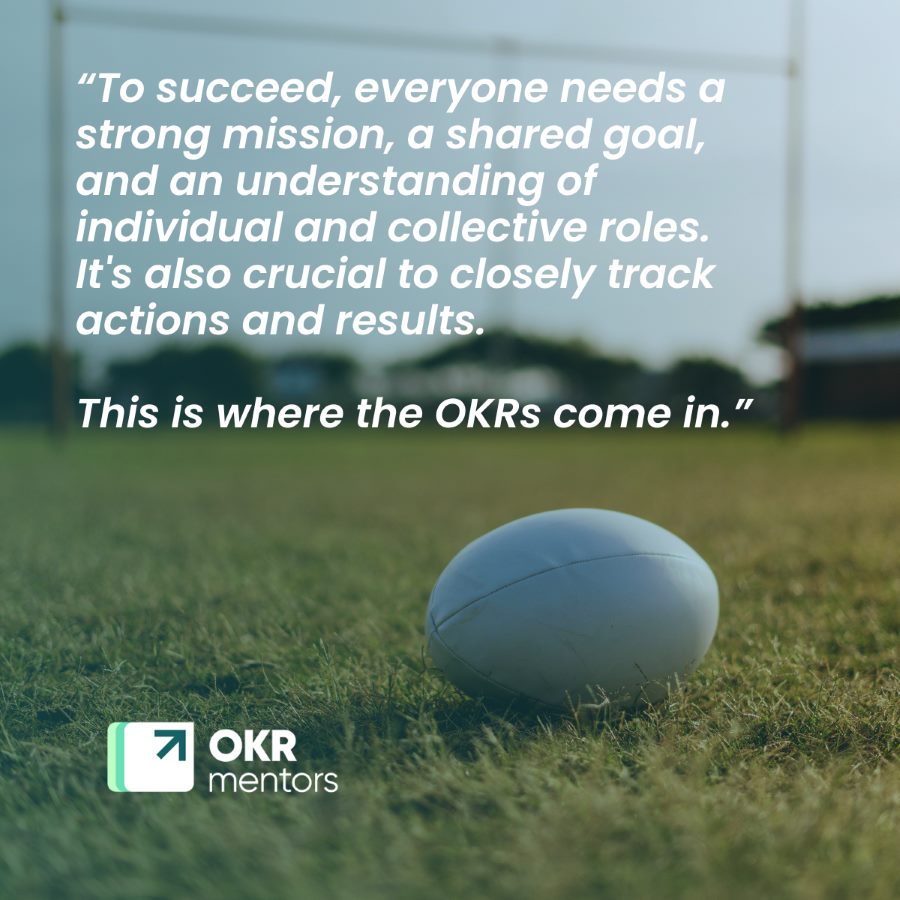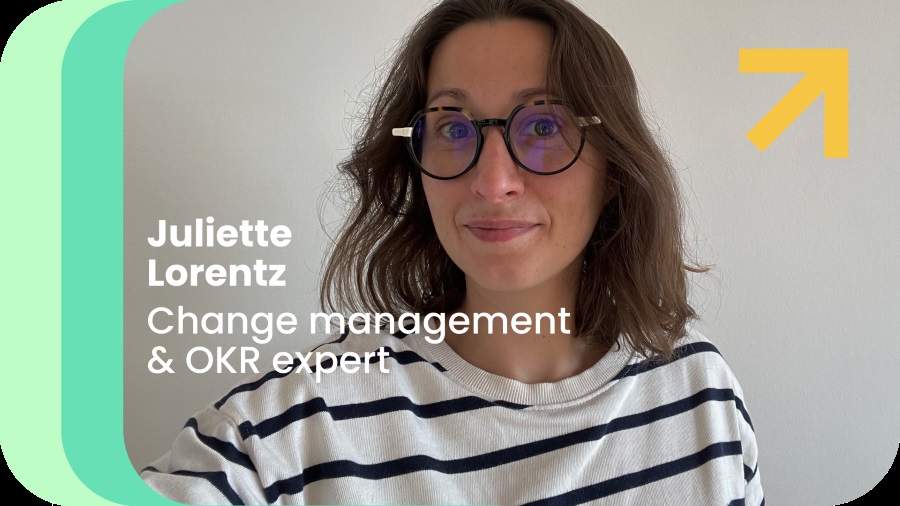How rugby teams can inspire our organizations to become great collectives and how OKRs can help achieve it.
“A great team is more than just a sum of talents, it is not a sum of talents. A great team is not an addition, it is a mission.” Fabien Galthié – French Rugby Union Coach.
The Rugby World Cup inspired me to draw a parallel between high performing sports teams and OKRs.
Rugby is a compelling sport. Everyone can agree on the immense mental and physical strength required for players to take the field and score among the world’s fiercest teams.
But their success is not based on individual talent alone. In fact, it is the collective that is the key to their success. The team, the way the players interact with each other : throwing the ball to the right player at the right time and in the right place without a second thought.
To achieve this, the coach has many responsibilities, and they all have their peculiarities and secret sauce. But there is one thing they cannot ignore: the mission. If there was only one job for a coach, it would be to rally the team around a common goal.
The coach defines what the team’s goals are for the season. This is a tricky & risky exercise because the coach’s responsibility is immediate and will have a massive impact on the team’s results throughout the year.
Having a mission is great but it is hardly enough to make a difference.
But how do you make this mission the common thread throughout the season?
How do you bring this collective adventure to life?
In every training session, in every match.
Coaches, players, medical staff, and every member of the extended team have a role to play in making this vision the cement of their team.
The coach is the living reminder of the team’s mission and we can say that their role is fully fulfilled when the goal is lived through and by the actions of every member.

Do you want to know the great principles of the XV de France ?
“Gather, unite, share “.
This is simple, clear & powerful.
We could say that sports teams are simpler than traditional work teams. Sure, they are made up of highly passionate players, but just like any other team, they face major challenges : player turnover, strong individuality, constant high pressure, demanding individual & collective training, poor work-life balance and much more. Living the dream does not sound like a dream after all … and thanks to this purposeful mission, the difficulties do not stop them from being great individuals and great team members.
Now let’s play a little game in the office. Ask anyone: What is our company’s mission?
You’ll probably get some insightful ideas, maybe some “I don’t know”, but no shared understanding of what our common purpose is. And Peter Drucker, back in the 90s, saw it coming “Management by objective works if you know the objectives. Ninety percent of the time you don’t.”
Most companies have a mission, but it is not shared across teams. It is not the shiny storytelling brought to life by inspiring speeches & actions that we need.
For me, OKRs are a powerful strategic communication tool. It helps to define a clear mission of what we want to achieve as a company. They are not necessarily shiny words, but they are concrete, as concrete as “becoming the future leader of the Rugby World Cup “. And within the company, each perimeter has to work towards the common goal, just as the wingers, backs, scrum-halves and the rest keep their posts. But it turns out that holding your own is not enough to win big.
What is really effective to coordinate the actions of all the players in order to win the game ?
It is the same in companies. Most of the work is done within the different pillars, but most of the game-changing actions need to be taken as a whole.
A funny head of HR once told me that his group was a collection of teams with different shirts, but that didn’t stop them wearing the same socks. Well, to be more precise, belonging to a particular brand or department should not be an excuse for not sharing a common goal (or socks).
The real competition is outside the organization, so it’s better to collaborate internally rather than be responsible for collective failures.
To succeed, everyone needs a strong mission, a shared goal, and an understanding of individual and collective roles. It’s also crucial to closely track actions and results.
This is where the OKRs come in.

Here are the three key stages where OKRs can have a big impact in turning the sum of your teams into a powerful collective :
Step 1 : A shared ambition
Leaders, such as the coach , provide the first impulse for change. Their daily task is to onboard all their team members and ensure alignment between what is being delivered and what the company strategy is aiming for.
Alignment starts at the top. And it needs to be visible to everyone in the organisation.
In this approach, the definition of OKRs is usually set with the board, and the definition framework enables management to end up with a synthetic and crystal clear vision of what they want to achieve.
That’s when the journey can begin.
Step 2 : Communication, communication, communication
This is almost always the part that goes wrong.
Once your mission and goals are set, it is essential to share them with every member of the organisation. If no one knows the strategy, how can you expect people to buy into it and align ?
Communication isn’t just about giving a big speech occasionally or, worse, sending a generic and impersonal email. Communication is about that big speech + conversations and feedback gathering + team brainstorms & alignment sessions + constant reminders of the vision + structured & recurrent follow-up + results monitoring and promotion + problem-solving sessions and so on…
The better prepared your change programme is, the more you’ll get out of it. Communication is not just about shiny words, it is about making them happen!
OKRs are a great tool for this, because beyond setting a clear strategy, the framework offers a wide range of communication and follow-up tools & processes. OKRs help you measure concrete results, adjust your actions regularly and share results across the organisation. It is about celebrating collective wins and driving value where it matters.
Step 3 : Ownership
Let’s face it, definition and animation are great, but there is still one important ingredient missing : people.
You need people to activate your entire mission, to make sure the communication and follow-up processes are set up and efficient. You cannot expect the organisation to manage all the processes by itself. That would be chaos.
So we need to define roles and clear responsibilities and, of course, implement them. Just like everyone in a rugby team has a role to play and knows how to play it!
In OKRs we have four main roles : the leaders, the sponsors, the champions & the KR owners. In any organisation these roles may be different. But without them, without clear ownership of the process, who will ensure that the vision is really on its way ?
It is not news that we can learn more from team sports to manage our teams.
Sure, we all have talented and skilled people. But that is not enough to lead our teams to victory.
The key ingredients for alignment are well known, but require real commitment and daily action from the top to the operations.
To get there, you need to embark on a strategic journey that involves every individual, every team and every department.
Build bridges between your strategy and operations, between departments, and unleash the power of your collective.
Inspire yourself with OKR best practice by clearly defining your mission and goals, communicating regularly, tracking progress and making sure everyone has a role to play.
Enjoy the rest of the Rugby World Cup 😊
This article was written by Juliette Lorentz
Juliette is an OKR enthousiast and consultant with 5 years of experience in driving OKR change programmes in large organisations such as Decathlon, Accor, Adeo. As Senior OKR Coach, she specializes in training, organisational deployment and team adoption to support companies in becoming an OKR driven collective.


